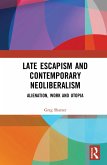Dieser Download kann aus rechtlichen Gründen nur mit Rechnungsadresse in A, B, BG, CY, CZ, D, DK, EW, E, FIN, F, GR, HR, H, IRL, I, LT, L, LR, M, NL, PL, P, R, S, SLO, SK ausgeliefert werden.
Hinweis: Dieser Artikel kann nur an eine deutsche Lieferadresse ausgeliefert werden.
"This collection is highly admirable for its clarity and thoroughness, and should be of great interest to anthropologists and others who are new to, or familiar with, Bourdieu's oeuvre." - Journal of the Royal Anthropological Institute
"The book manages that extraordinary feat of offering both accessible introductions to Bourdieu's concepts that are 'good to think with' whilst also offering a depth of analysis that will engage scholars already familiar with Bourdieu's work. Whether a chapter says something new about familiar concepts like habitus, field, or capital, or it introduces less discussed concepts like conatus, the writing stretches the reader's understanding of what sociological theory can be." - Arthur Frank, University of Calgary, Canada









